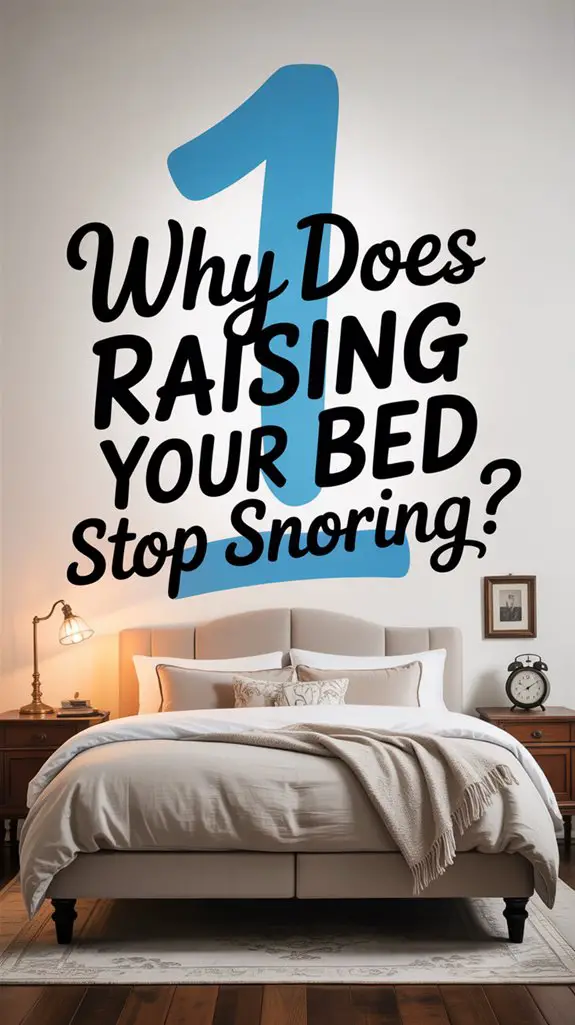When I first heard that raising my bed could help with my snoring, I was skeptical. But after trying it, wow, what a game-changer!
Sleeping elevated made such a difference. I woke up feeling rejuvenated instead of groggy. It’s crazy how gravity plays a role, right? With my soft palate staying put, breathing got so much easier.
I remember my partner’s cheerful, “No more freight train sounds!” That made my day.
Here at Corala Blanket, we’re all about promoting better sleep, so trust me when I say a slight incline can work wonders.
Have you given it a shot? It’s simple and might just be what you need for those sweet dreams. Let’s dive in together!
Table of Contents
Quick Takeaways
- Raising your bed enhances airway dynamics by using gravity to keep the tongue and soft palate in a better position.
- An elevated sleeping position allows for improved airflow, reducing the likelihood of snoring episodes during the night.
- Inclined sleeping activates airway muscles, helping to keep the airway open and minimizing snoring-related events.
- Studies show that head elevation can significantly reduce snoring severity and improve overall sleep quality.
- A slight incline (around 12 degrees) is effective for most individuals, alleviating snoring and providing a comfortable sleep experience.
The Science Behind Snoring and Sleep Apnea
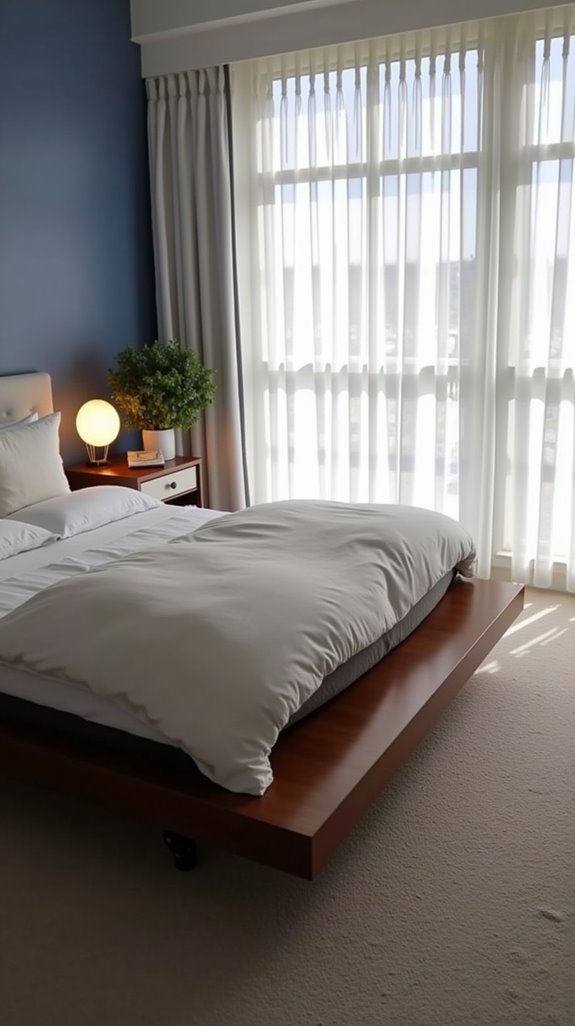
When it comes to snoring and sleep apnea, understanding the science behind these nighttime nuisances is key.
Have you ever wondered why some people snore loudly while others don’t, or why it can impact your sleep quality?
The snoring mechanisms involve the vibration of relaxed throat tissues, like the tongue and uvula, as air rushes through a compromised airway. Chronic snoring may indicate a serious health condition that requires attention. In fact, nightly disturbances such as this could stem from historical sleep positions that influence airway alignment.
Snoring occurs when relaxed throat tissues vibrate due to airflow restrictions in the airway.
Anatomical variations, such as a thick soft palate or excess weight, can constrict these airway dynamics.
When the airway collapses, it can lead to obstructive sleep apnea, causing those annoying pauses in breathing.
Knowledge is power, so let’s tackle these issues head-on!
How Bed Elevation Affects Airway Patency
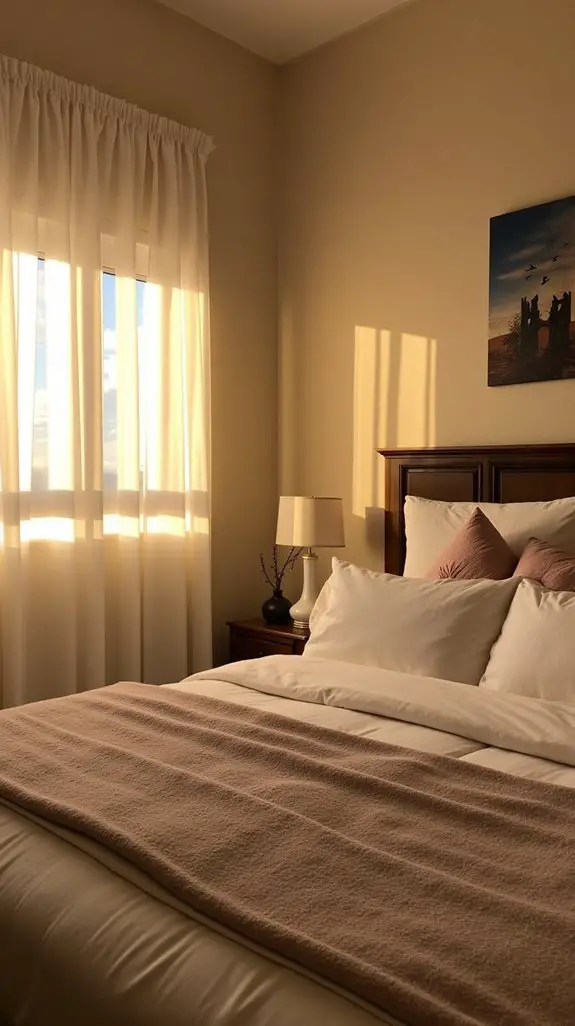
Snoring can be a real drag, not just for the snorer but for anyone within earshot!
Imagine elevating your bed—it’s not just a cozy upgrade, it’s a game-changer for airway mechanics. When I sleep elevated, gravity’s less of a bully, keeping my tongue and soft palate where they belong. This simple elevation impacts my airway area, enhancing airflow and reducing snoring events. Plus, it activates my airway muscles, making them work harder to stay open. Additionally, maintaining an open airway during sleep can significantly improve airflow obstruction, leading to a more restful night. Furthermore, sleeping at an incline can also reduce GERD symptoms, which may further contribute to better sleep quality.
Who knew raising my bed could lead to better sleep and quieter nights?
Trust me, you’ll appreciate the difference!
Benefits of Inclined Bed Therapy in Improving Sleep Quality
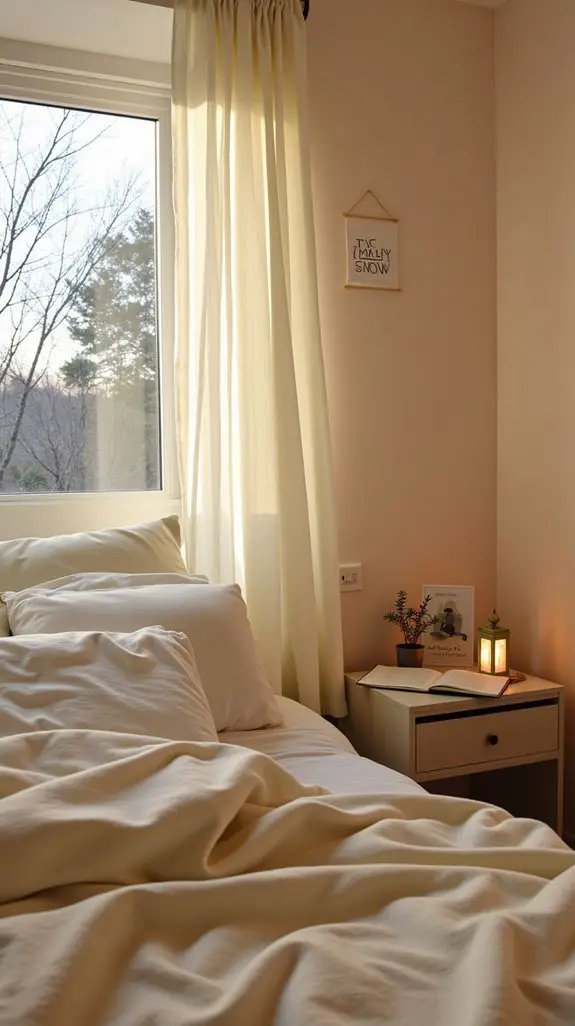
Who knew that something as simple as tilting your bed could work wonders for your sleep? With inclined bed therapy, I’ve experienced a boost in sleep quality that’s hard to beat. Research suggests that it can also reduce acid reflux, which has further improved my nights.
Here’s what I’ve noticed:
| Benefit | Description | Personal Experience |
|---|---|---|
| Faster Sleep Onset | Falling asleep quicker | From minutes to mere seconds! |
| Deeper Sleep Cycles | More restorative sleep | I wake up feeling like a champion! |
| Consistent Sleep Patterns | Less tossing and turning | Hello, blissful nights! |
Embracing inclined therapy truly transforms the way we sleep. Research indicates inclined sleeping may benefit conditions like sleep apnea and has added to my comfort at night. Have you tried it yet? You just might be amazed!
Evidence From Clinical Studies on Bed Elevation
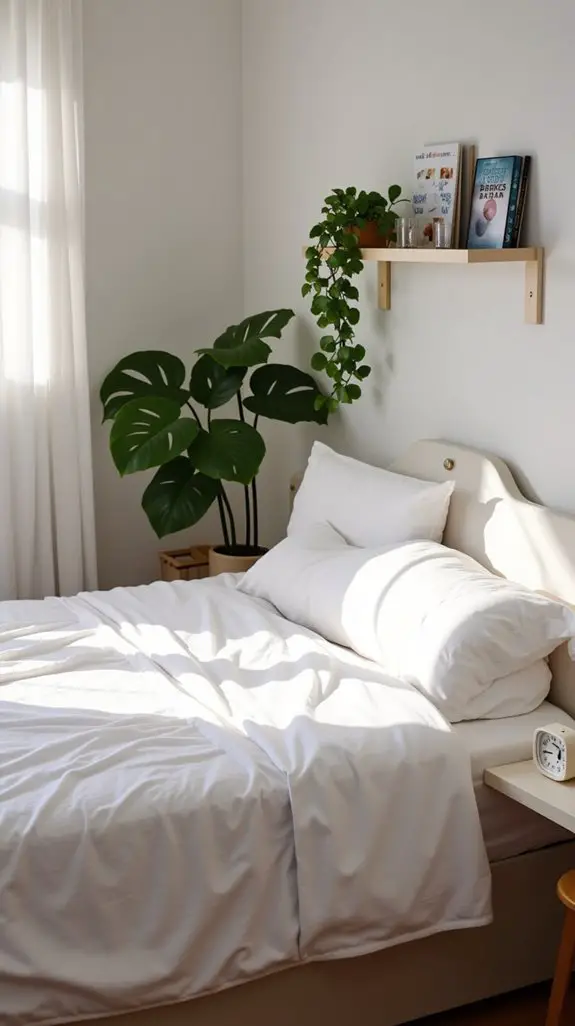
Elevating your bed might sound like a small change, but it’s a game changer when it comes to tackling snoring and improving sleep quality.
Clinical studies show that head elevation greatly boosts the airway’s size. Picture this: when your head’s up, your throat’s free from the pesky clutches of gravity.
Patients reported a 72% improvement in snoring severity just by using focused elevation techniques.
Patients experienced a remarkable 72% reduction in snoring severity through effective head elevation techniques.
Isn’t that incredible? Plus, sleeping inclined can reduce those annoying wake-ups, letting you enjoy deeper, more restful sleep. Furthermore, sleeping at an angle can also alleviate symptoms of acid reflux, which often contributes to nighttime disruptions.
Choosing the Right Elevation for Optimal Results

While it may seem like a minor adjustment, choosing the right elevation for your bed can play an essential role in reducing snoring and enhancing your overall sleep experience. Additionally, creating a comfortable sleep environment with pop diva inspired bedding can further enhance your nighttime routine.
So, how do you decide? A 12-degree incline works wonders, but personal comfort varies. Here’s a quick guide to help you find your sweet spot:
| Incline Range | Recommended For | Trial Adjustments |
|---|---|---|
| 2-4 inches | Mild snorers | Minimal changes |
| 5-7 inches | Most sleepers | Balanced comfort |
| 8-12 inches | Severe snorers | Monitor carefully |
Explore and adapt to reveal your best night’s sleep!
FAQ
Can Raising the Bed Alleviate Snoring in Children?
Raising the bed can indeed alleviate child snoring. It influences sleep position positively, reducing airway obstruction. I’ve seen how even slight elevation can promote better breathing, making those snore-free nights much more achievable.
How Long Should I Maintain an Elevated Bed Position?
I’ve found that maintaining an elevated bed position for at least 30 nights greatly improves sleep quality. The ideal angle of elevation varies, but consistency is key to lasting snoring reduction and better rest overall.
Will Elevating My Bed Help With Allergies or Congestion?
Yes, elevating my bed offers elevation benefits that greatly improve allergy relief. By reducing nasal congestion and preventing mucus pooling, I sleep better and wake up feeling more refreshed and energized each day.
How Do I Ensure My Bed Remains Stable When Elevated?
To make certain my bed remains stable when elevated, I utilize strong bed stabilization techniques and opt for adjustable bed frames. This combination guarantees secure elevation and minimizes risks of shifting, providing me with peace of mind while sleeping.
Can Snoring Occur in Any Sleeping Position Even With Elevation?
Sure, snoring can sneak up in any sleep position, even with elevation. Who knew elevating my head didn’t guarantee no airway obstruction? It’s ironic how sleep positions can still betray our best intentions for silence.
References
- https://pmc.ncbi.nlm.nih.gov/articles/PMC9021938/
- https://pmc.ncbi.nlm.nih.gov/articles/PMC5700252/
- https://www.youtube.com/watch?v=IfgbCOAl3XI
- https://casper.com/blogs/article/do-adjustable-beds-help-with-snoring
- https://clinicaltrials.gov/study/NCT04053738
- https://www.health.harvard.edu/staying-healthy/do-products-that-claim-to-stop-snoring-actually-work
- https://www.medicalnewstoday.com/articles/inclined-bed
- https://www.mayoclinic.org/diseases-conditions/snoring/symptoms-causes/syc-20377694
- https://med.uth.edu/orl/2020/01/10/snoring-sleeping-disorders-and-sleep-apnea/
- https://medlineplus.gov/genetics/condition/obstructive-sleep-apnea/
- https://www.mayoclinic.org/diseases-conditions/sleep-apnea/symptoms-causes/syc-20377631
- https://www.ama-assn.org/public-health/prevention-wellness/what-doctors-wish-patients-knew-about-snoring
- https://www.ncbi.nlm.nih.gov/books/NBK459252/
- https://www.sleepfoundation.org/snoring
- https://my.clevelandclinic.org/health/diseases/8718-sleep-apnea
- https://ozlosleep.com/blogs/news/how-high-to-raise-bed-for-snoring
- https://pmc.ncbi.nlm.nih.gov/articles/PMC11277951/
- https://www.floridaentassociates.com/blog/how-your-sleeping-position-affects-snoring-and-sleep-apnea/
- https://www.nature.com/articles/srep18188
- https://www.atsjournals.org/doi/10.1164/ajrccm.164.2.2010012
- Mood Makers: Small Details That Transform a Room - October 17, 2025
- Why Ancient Civilizations Elevated Their Beds - October 17, 2025
- Why Elevate Your Bed With Wooden Blocks? - October 17, 2025

